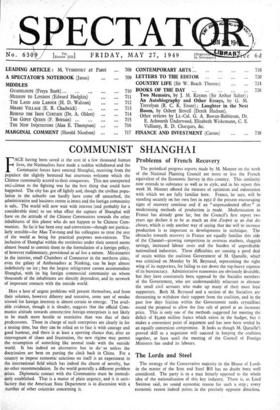COMMUNIST SHANGHAI
FACE having been saved at the cost bf a few thousand human lives, the Nationalists have made a sudden withdrawal and the Communist forces have entered Shanghai, receiving from the populace the slightly bemused but courteous welcome which the Chinese customarily accord to their conquerors. This not unexpected anti-ciimax to the fighting was far the best thing that could have happehed. The city has got off lightly and, though the civilian popu- lation in the suburbs can hardly have come off unscathed, the administrative and business centre is intact and the foreign community is safe- The world will now wait with interest (and probably for a considerable time) to see what effect the capture of Shanghai will have on the attitude of the Chinese Communists towards the other inhabitants of this planet who do not happen to be Chinese Com- munists. So far it has been easy and convenient—though not particu- larly sensible—for Mao Tse-tung and his colleagues to treat the rest of the world as being for practical purposes non-existent. The inclusion of Shanghai within the territories under their control seems almost bound to commit them to the formulation of a foreign policy, of however rudimentary, provisional or ad hoc a nature. Missionaries in the interior, small Chambers of Commerce in the northern cities, even the galaxy of Ambassadors at Nanking, can be kept almost indefinitely on ice ; but the largest refrigerator cannot accommodate Shanghai, with its big foreign commercial community on whom thousands of the inhabitants are directly dependent, and its network of important contacts with the outside world.
Here a host of urgent problems will present themselves, and from their solution, however dilatory and tentative, some sort of modus vivendi for foreign interests is almost certain to emerge. The avail- able evidence, though it is slender, suggests that the official Com- munist attitude towards constructive foreign enterprises is not likely to be much more hostile or restrictive than was that of their predecessors. Those in charge of such enterprises are clearly in for a testing time, but they can be relied on to face it with courage and good humour, and there is at least a sporting chance that, after an interregnum of chaos and frustration, the new regime may permit the resumption of something like normal trade with the outside world. It has indeed no alternative but to do* so unless the doctrinaires are bent on putting the clock back in China. For a country to impose economic sanctions on itself is an experiment in the international field which has indeed the charm of novelty, but no other recommendation. In the world generally a different problem arises. Diplomatic contact with the Communists must be immedi- ately established. That is a matter of plain urgency, and it is satis- factory that the American State Department is in discussion with a number of other countries concerning it.






































